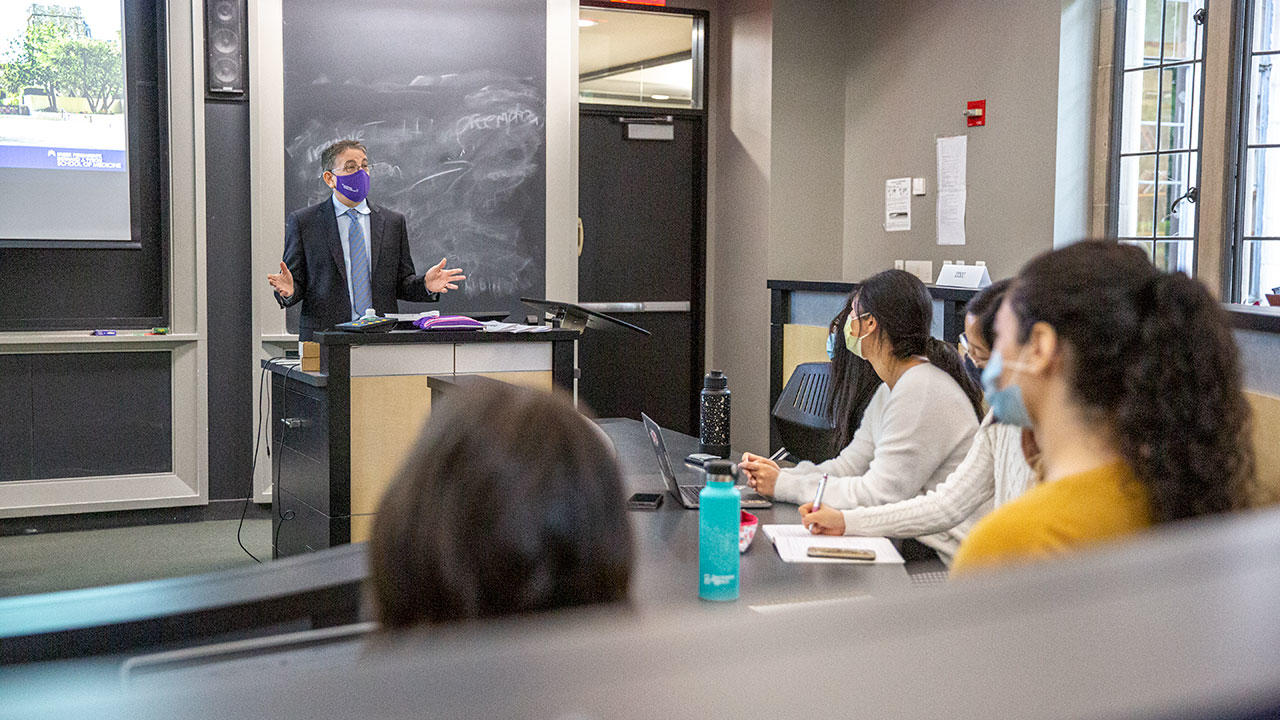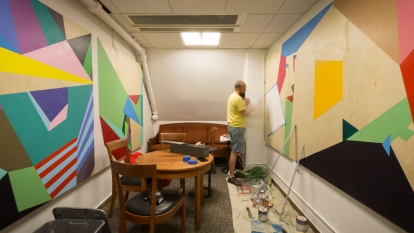
The Doctor Is Out—Bringing Inclusivity to Medicine
“‘Out’ has a lot of meanings,” said Dr. Mark Schuster, the founding dean and CEO of the recently created Kaiser Permanente Bernard J. Tyson School of Medicine, during an October 4 discussion with President Paula Johnson at the College.
“The Doctor Is Out: Perspectives on Identity and Difference in Medicine,” a conversation hosted by Career Education and Wellesley LGBTQ+ Programs and Services, brought Schuster to Wellesley to discuss the current state of diversity in medicine, the progress the profession has made since he was a medical student in the 1980s, and the work that remains to be done relating to issues of inclusivity and equity. Schuster’s moving speech at the 2010 Children’s Hospital Boston LGBT & Friends Celebration, which was published in outlets across the country, including WBUR, served as a baseline for much of the night’s discussion.
For Johnson and Schuster, the event was a reunion of sorts. Schuster was a medical student under Johnson, when she was in her first year of post-medical school training, known as intern year, working at Brigham and Women’s Hospital in Boston. The two joked about it on stage. “We’ve known each other for a long time, and we’re old friends,” Johnson said. “These relationships keep coming back, which is really so wonderful.”
The evening began with Schuster recalling his experience as a medical student more than 30 years ago, and the difficulty he and other LGBTQ+ students faced finding faculty members who could serve as advisors to students who shared that aspect of their identity. “I showed up at medical school, and over the course of the first years, came out one-by-one to classmates, but I never imagined that I might get to come out to faculty,” he said, noting that there weren’t many openly LGBTQ+ faculty. “In general, we were mentoring each other. I benefited greatly from students who were ahead of me, who started a lesbian and gay student group, and were quite brave in doing so.”
Schuster and Johnson discussed the importance of bringing your authentic self to the patient-doctor relationship. “For me, when we’re caring for patients, there is a relationship that we develop, there is a connection that we make as they are sharing with us. I’m not saying we share our lives with them, but being comfortable with yourself, that is part of being able to connect with patients,” Johnson said.
“There are many more open students, open faculty, and open staff in schools, and...It makes a real difference. We’re always learning and always progressing.”
Mark Schuster
Schuster added that in the digital era, openness can extend beyond medical school or the doctor’s office to how we present ourselves online. He suggested physicians be inclusive in their online presence, noting that while LGBTQ+ patients might not necessarily need a physician who shares that aspect of their identity, they “might want to know that they’re going to a practice that has at least some women who are LGBTQ+ in that practice, so that they know that their physician has colleagues who are members of this community, and that’s also another way we can serve our patients.”
Later, Johnson and Schuster discussed the pace of diversification in the field of medicine and what can be done to accelerate its steady, if gradual, move toward greater equity. “That’s something that I think we have an obligation to change, and to try to change as quickly as we can,” Schuster said. “We need to create more inclusive environments.” He said it is critical to increase the diversity among medical school faculty so that students from underrepresented populations see their identities represented in their professors.
Toward the end of the conversation, an attendee asked what it was like to witness discrimination against LGBTQ+ patients as a medical student and what medical students could do to combat such discrimination. Schuster responded with a story from his time in medical school. A physician was refusing to perform a surgery due to a patient’s sexual identity, and Schuster spoke up. “I just lost it,” he said, noting that his reaction was out of step with his calmer character, but that he felt an obligation to advocate for the patient. “I said, ‘So, she’s a lesbian, what does it matter?’”
“What I’m hearing you say,” Johnson said, “and what I strongly believe, is that students have agency, and that students have the ability to bring their humanity and their knowledge to the situations they find themselves in.”
While Johnson and Schuster both acknowledged that greater progress toward equity in the field of medicine is needed, the conversation demonstrated just how far the profession has come since the 1980s.
“So many things have changed,” said Schuster. “The idea that you would have openly gay movie stars, or a gay candidate for president, none of that in my mind was conceivable. And in medical education, there are many more open students, open faculty, and open staff in schools, and I think that is really wonderful. It makes a real difference. We’re always learning and always progressing.”
“It was a very insightful and thoughtful conversation,” said Lana Shanab ’22, who is double majoring in chemistry and health and society, after the event. “I’m looking at medical schools now, to apply later in the future, and it’s comforting and exciting to think about ways in which some medical schools have begun to reconsider their school’s curriculum, and in this case, start there to ensure a more inclusive and modern approach to understanding and practicing medicine.”



